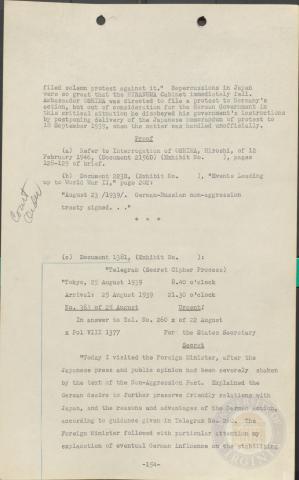
Page 154
| Parent | Collaboration Between Japan, Germany and Italy Volume III |
|---|---|
| Date | 23 February 1940 |
| Language | English |
| Collection | Tavenner Papers & IMTFE Official Records |
| Box | Box 15 |
| Folder | Japan, Germany, Italy Collaboration Vol 3 |
| Repository | University of Virginia Law Library |
filed solemn protest against it." Repercussions in Japan were so great that the HIRANUMA. Cabinet immediately fell. Ambassador OSHIMA. was directed to file a protest to Germany's action, but out of consideration for the German Government in this critical situation he disobeyed his government's instructions by postponing delivery of the Japanese memorandum of protest to 18 September 1939, when the matter was handled unofficially.
Proof
(a)Refer to Interrogation of OSHIMA., Hiroshi, of 12 February 1946, (Document 2156D) (Exhibit No. ), pages 128-129 of brief.
(b)Document 223R, (Exhibit No. ), "Events Leading up to World War II," page 202:
"August 23 /1939/* German-Russian non-aggression
treaty signed. • ."
* **
(c) Document 1381, (Exhibit No. ):
"Telegram (Secret Cipher Process) "Tokyo, 25 August 19398.40 o'clock
Arrival: 25 August 1939 21.30 o'clock No. 363 of 25 AugustUrgent.'
In answer to Tel. No. 260 x of 22 August x Pol VIII I377For the States Secretary
Secret
"Today I visited the Foreign Minister, after the Japanese press and public opinion had been severely shaken by the text of the Non-Aggression Pact. Explained the German desire to further preserve friendly relations with Japan, and the reasons and advantages of the German action, according to guidance given in Telegram No. 260. The Foreign Minister followed with particular attention my explanation of eventual German influence on the stabilizing
